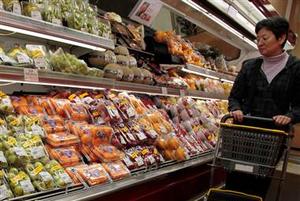Radiation risksRadiation fears cripple Japanese food exports
Japanese agricultural exports have yet to recover from the 11 March earthquake and tsunami due largely to fears of radioactive contamination; to combat these fears, local governments have done all they can to assure consumers that their products are safe; consumers remain wary despite these reassurances, and as a result the Japanese agricultural sector is struggling

Concerns about contamination of food continue // Source: newsvine.com
Japanese agricultural exports have yet to recover from the 11 March earthquake and tsunami due largely to fears of radioactive contamination.
Following the nuclear crisis at the Fukushima Daiichi atomic energy plant and the explosions that sent radiation spewing into the air, countries have been hesitant to import Japanese produce.
Apples, which account for 40 percent of Japan’s total agricultural exports, have been hit hard with an 80 percent decrease between April and June compared to the same time period last year. Taiwanese consumers, which constitute a large portion of Japan’s agricultural export market, have largely shied away from Japanese apples.
For instance one store on the outskirts of Taipei, which usually sells Japanese apples, now stocks apples from Chile and New Zealand. Japanese apples normally account for 30 percent of the supermarket’s apple sales, but the store has chosen to stop purchasing apples following the Fukushima nuclear accident.
“While the Japanese apples are the most delicious, I will not buy them if there are safe ones from other nations,” said a 47-year-old female of the supermarket. “For Taiwan, (the Fukushima nuclear accident) is a much more serious and closer issue than Chernobyl.”
Other consumers shared her concern. One mother said, “I stopped buying Japanese fruits after a TV show said they were dangerous.”
To combat these fears, local governments have done all they can to assure consumers that their products are safe.
Government officials from Aomori Prefecture, which produces roughly 90 percent of Japan’s apples, has launched an aggressive campaign in Taiwan to alert customers that their apples have been tested for radiation and that they were safe by visiting Taiwan’s health ministry, local television stations, and produce companies.
Consumers are still wary despite these reassurances, and as a result the value of apple exports in May plummeted by 86 percent over last year to 11.31 million yen, roughly $147,000.
“While there are many people who do not know that Aomori is more than 300 kilometers away from Fukushima, they do know it is in the same Tohoku region. Consumers are wary,” said the executive of one Taiwanese supermarket.
With exports falling and consumers still wary, apple producers are struggling.
“We cannot export if we cannot make a profit,” one apple producer said. “If apples that would have gone to exports end up in the domestic market, the prices in Japan would also fall.”
Other agricultural exports like meat and fish have also suffered as a result of the negative publicity from the Fukushima nuclear accident.
An official at Fukuoka Dydo Seika Co., which exports agricultural products from around Japan, said, “Even if we publicize the fact that there is no radiation contamination, foreign companies will not even look at agricultural products from eastern Japan.”
Currently seventeen nations still have import bans on Japanese agricultural products, particularly from regions near Fukushima Prefecture.
